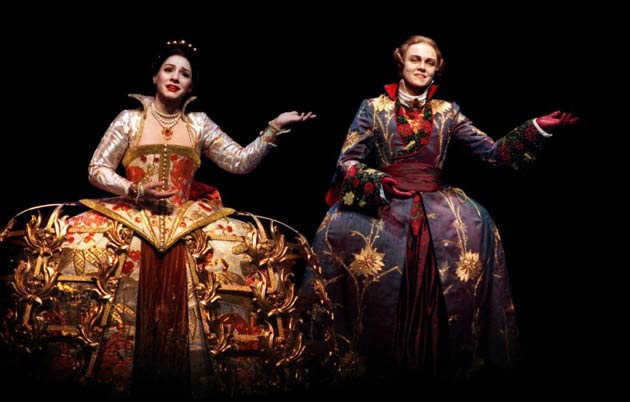Artaxerxes, Linbury Studio, London<br/>Smith Quartet/Axelsson, Wigmore Hall, London<br/>London Sinfonietta/Bang on a Can/Reich, Royal Festival Hall, London<br/>Royal Liverpool Philharmonic/Petrenko, Philharmonic Hall, Liverpool
A sumptuous production of Thomas Arne's Italian-influenced opera, and tributes to Keith Volans, Steve Reich and Sibelius

Forty years ago, had you asked a child to name a work by Thomas Arne, they would likely have answered "Where the bee sucks, there suck I". Along with "Nymphs and Shepherds", "The Raggle-Taggle Gypsies" and "The Drunken Sailor", Arne's jaunty Shakespeare song was once the stuff of damp afternoons, rheumatic radiators, shrivelled conkers and scraped knees. These days, schools sing a medley of "Kids in America" and "Karma Chame-leon", and all that remains of Arne is "Rule, Britannia!". Which makes a Royal Opera House production of Artaxerxes an unusual proposition.
Arne was ever vulnerable to changing tastes. Born and bred in Covent Garden, the Eton-educated upholsterer's son lived in a city that had cast off the "Italian bondage" of opera seria and embraced the burlesques and ballad operas of John Gay and Frederick Lampe. By the time the composer Stephen Storace was born, in 1762, his father thought London too low a place for a proper musical education and packed him off to Naples. Written in the same year, Artaxerxes was Arne's attempt to reinvent opera seria for English ears, post-Handel, pre-Haydn. Variety is its engine. Histrionic coloratura arias alternate with Pleasure Garden serenades and strophic alehouse ditties. The orchestral score, played here by the Classical Opera Company under Ian Page, is attractive, with shivering strings that recall the opening of Arne's cantata, The Morning, suave bassoons, gambolling flutes, heroic trumpets, shy clarinets and, in Arbaces's lament, "O too lovely, too unkind", sighing figures for divisi violas. Recitatives aside, the Georgian foot would have had little difficulty tapping in time.
Played out on a cobalt-blue stage, with a catwalk extension wrapped around the orchestra pit, Martin Duncan's faux-baroque Linbury Studio staging seems not to have progressed past the stage of placing paper figures on a scale model. Trussed into Johan Engels's lavishly embroidered harem pants and panniers, with buttock-swishing wigs for the heroes and metallic exoskeletons for the villains, the cast are exotic flightless birds; unable to do more than throw poses. With character development at a low not seen since Jonathan Miller's Tamerlano, removing the "fourth wall" is a mistake. But who cares about acting when the eye can feast on turquoise velvet, fuchsia silks, exquisite slippers and the glittering telescopic vegetable steamer and rotary-drum Parmesan grater that form Artaxerxes's throne.
Duncan's thesis appears to be that power is a gilded cage, though the most affecting performance comes from Rebecca Bottone as Semira, least powerful of the characters. Aside from her immaculate phrasing and exquisite movement, Bottone is the only singer to translate the codified gestures of baroque theatre in her eyes. As Arbaces, Caitlin Hulcup enjoys the best of Arne's arias, while Elizabeth Watts (Mandane) has the flashiest, producing gorgeous top notes from a fragile middle register and forced chest. Marooned in the passive title role, Christopher Ainslie sports the anxious brow of a myopic who may or may not have seen a familiar face, but sings with tender dignity. As the lustful Rimenes and venal Artabanes, Steven Ebel and Andrew Staples swagger and snarl. Arne-curious listeners will relish Page's vivid musical performance. As a piece of theatre, however, Duncan's production illustrates why opera seria fell out of fashion.
Last Saturday saw an angst-inducing clash of events celebrating two of the most distinctive living composers. At the Wigmore Hall, Jonny Axelsson and the Smith Quartet gave the first of two concerts marking the 60th birthday of Keith Volans. The Smith Quartet's soulful performance of Hunting: Gathering (1987) underlined the shredded romanticism in Volans's post-minimalist masterpiece, with echoes of Janácek in its bold, sad figures. I mean no disrespect to other percussionists when I say that Axelsson is the most extraordinary drummer I have seen, or to other composers when I say that She who Sleeps with a Small Blanket (1985) and Asanga (1998) are the most extraordinary works: ferocious, lyrical and human.
A few hours later, Steve Reich enjoyed a rock-star reception at the Royal Festival Hall. This was a feel-good, greatest-hits programme that opened with a perfunctory version of Clapping Music (1972) from Reich and David Cossin, before guitarist Mark Stewart's gloriously laid-back performance of Electric Counterpoint (1987). Bang on a Can's Sextet (1984) was a gleaming ballet for bowed vibraphones, while London Sinfonietta's Music for 18 Musicians (1974-76) stopped time for 57 alluring, amniotic minutes. A blatant bank-roller for London Sinfonietta, it made me think of a James Taylor concert: "Got their baby/ Got their blanket/ Got their bucket of beer", as the song goes. Happy as I am to share the group hug, the tribute-band atmosphere overshadows Reich's invention.
At Liverpool's Philharmonic Hall on Sunday afternoon, the warm glow was that of a city celebrating a decisive transformation. Once demoralised and shabby, the Royal Liverpool Philharmonic is, in its third year under Vasily Petrenko, an orchestra with a proud, sweet and true sound: responsive, expressive and finely blended. Petrenko's Sibelius sounds closer to Tchaikovsky than Dvorák, more city gent than country mouse. But the fitful, musky intensity of Baiba Skride's tone in the Violin Concerto was expertly echoed in the poised orchestral accompaniment, the brass had formidable bulk and menace in Finlandia, and the rolling themes of the Second Symphony blazed with longing. As comfortable as the Linbury is not, Philharmonic Hall has two acoustic idiosyncracies: highlighting every note from the tuba, and amplifying every cough.
'Artaxerxes' (020-7304 4000) to 14 Nov
Subscribe to Independent Premium to bookmark this article
Want to bookmark your favourite articles and stories to read or reference later? Start your Independent Premium subscription today.

Join our commenting forum
Join thought-provoking conversations, follow other Independent readers and see their replies